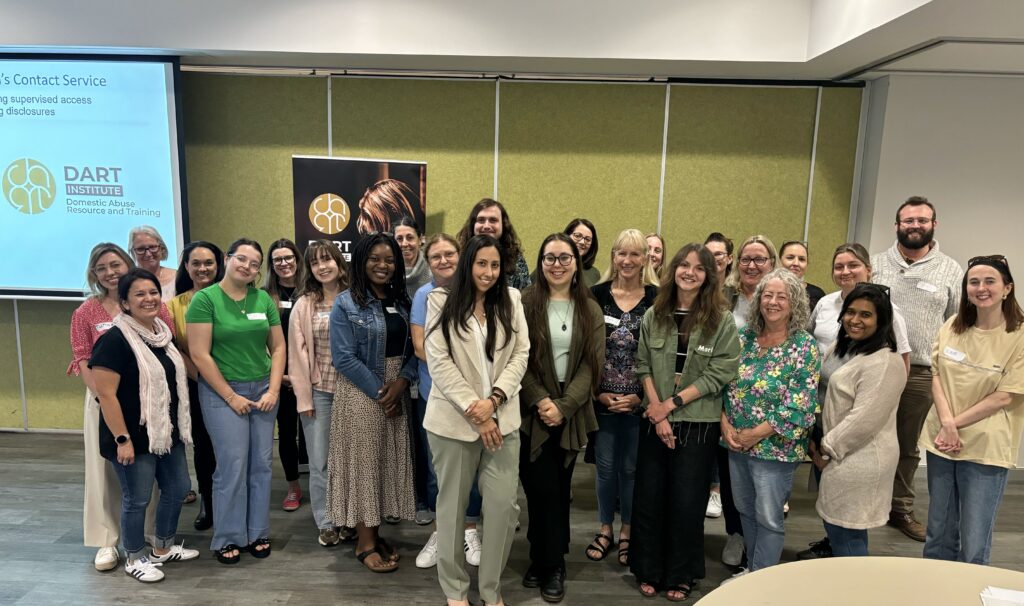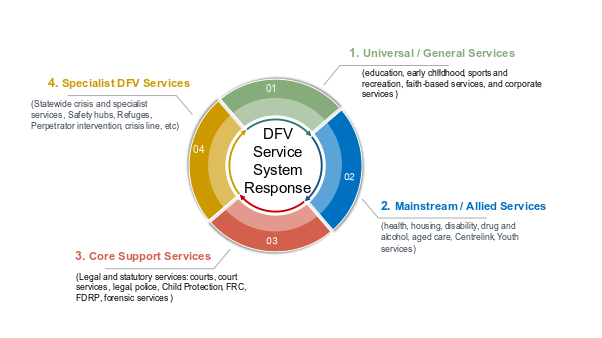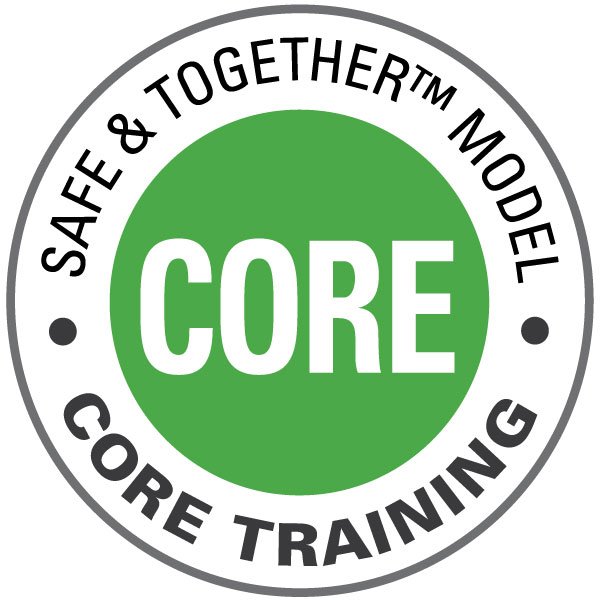Our comprehensive family, domestic, and sexual violence training programs are designed to address the complexities of violence through evidence-based, trauma-informed, and culturally safe responses.
Guided by the National Plan to End Violence Against Women and Children 2022–2032, state-based frameworks, and national competencies, DART Institute delivers training that aligns with best-practice prevention and response standards.
We work in partnership with organisations to tailor programs that build workforce capability – equipping staff to recognise, prevent, and respond safely and effectively to violence within their roles and communities.

Explore our specialist family, domestic, and sexual violence training programs, designed to address the complexities of violence through evidence-based, trauma-informed, and culturally safe responses.

Filter by Tags
Working Therapeutically with children affected by FDV is a two-day tertiary course. This course provides the advanced knowledge and skills for staff to undertake therapeutic work with children including, comprehensive risk assessment where children are at risk due to FDV. Participants will also learn how to collaboratively safety plan and manage risk inclusive of how to contribute to a Multi-Agency Case Management Meeting (MACM).
This course utilises current child development frameworks and has been developed in line with National Competency CHCDFV002 Provide Support to Children Affected by Domestic and Family Violence.
Primary Prevention
In-house, Virtual online classroom
Identify and Respond to Risk Masterclass is a two-day tertiary course that provides the advanced knowledge and skills for staff to undertake in-depth, comprehensive risk assessment where clients are at risk due to family and domestic violence.
Participants will also learn how to work collaboratively to develop comprehensive safety plans and manage risk. Participants will also learn relevant skills in order to contribute to a Multi-Agency Case Management Meeting (MACM).
This course utilises the West Australian Common Risk Assessment and Risk Management Framework (CRARMF) and has been developed in line with National Competency CHCDFV012 Make Safety Plans with People Experiencing Domestic and Family Violence.
Primary Prevention
In-house, Virtual online classroom
Group counselling has its own set of dilemmas for men that must be addressed by counsellors for it to be a successful therapeutic experience. Men usually attend group counselling because they have been mandated to do so by authorities or by significant others, usually in order to address abusive behaviour.
This one-day training, provides an overview of some of the core issues that almost all men's-group facilitators face. These issues include how to motivate participants, develop a therapeutic relational process, how to create safety within the sessions, how to monitor the group process, how to monitor individual progress and how to intervene effectively.
This course utilises relevant state-based risk assessment and management frameworks and developed in line with national competency CHCDFV009 Establish Change promoting relationship with users of domestic and family violence.
Primary Prevention
In-house, Virtual online classroom
When working with survivors (adult and child) or users of violence, it is essential to use language that reflects a survivor, strength-based approach, a perpetrator-facing, and a perpetrator-driven risk approach. This ensures behaviour patterns are prominent and visible, survivor resistance and strengths are at the forefront of responses and, service responses are better able to assess risk and imminency to risk. Accordingly, in domestic and family violence work, our language should focus on perpetrator accountability and a behaviour pattern-based approach. This workshop has been developed to align with the internally accredited Safe and Together ™ model.
This one-day workshop will provide further skills and knowledge of best practice when capturing documentation in family domestic and sexual abuse matters.
Primary Prevention
In-house, Virtual online classroom
Family and Domestic Violence-informed Supervisor training is a two-day tertiary course. This course provides the advanced knowledge and skills for staff to be able to undertake in-depth, comprehensive FDV and sexual violence-informed supervision to their staff. Participants will also learn the competencies of effective supervisors, function of supervision, and processes while bringing FDV and sexual violence-informed skills into supervision.
This course is recommended for supervisors and managers who have attended previous FDV-informed training.
Primary Prevention
In-house, Virtual online classroom
Understanding Workplace Trauma and Self Care Strategies is a half day interactive workshop.
This workshop helps participants to understand the body’s stress responses when exposed to high risk cases. Participants will also identify roles and responsibilities for their own personal wellbeing as well as how to support colleagues.
Participants will have the opportunity practice self-care techniques within the workshop and to develop their own personalised self-care action plan.
Primary Prevention
In-house, Virtual online classroom
Working Therapeutically with children affected by FDV is a two-day tertiary course. This course provides the advanced knowledge and skills for staff to undertake therapeutic work with children including, comprehensive risk assessment where children are at risk due to FDV. Participants will also learn how to collaboratively safety plan and manage risk inclusive of how to contribute to a Multi-Agency Case Management Meeting (MACM).
This course utilises current child development frameworks and has been developed in line with National Competency CHCDFV002 Provide Support to Children Affected by Domestic and Family Violence.
Primary Prevention
In-house, Virtual online classroom
DART Group can work with your organisation to provide specific organisation foundational Domestic and Family Violence awareness and response training.
Here at DART Group through specialist knowledge we can provide guidance and best practice regardless of where you sit in the service system response.
We utilise all relevant frameworks for all our training to ensure they are in line to national competencies, legislation and frameworks. Through our foundations training we have been able to support health, GP’s education and specialist services.
Primary Prevention
In-house, Virtual online classroom
Unconscious bias is a 3-hour training that supports employees in identifying attitudes and patterns of perceptions that are held subconsciously. Unconscious bias influences thoughts and actions that can create unfair advantages or disadvantages without the decision-maker’s awareness. Through this interactive session you will learn about explicit and unconscious bias, examine commonly found biases in the workplace and how these impact on performance and discuss solutions and tools available to individuals and groups to overcome the issue of unconscious bias.
Primary Prevention
In-house, Virtual online classroom
Primary prevention foundations is a 3-hour in-person or virtual course that, explores the gender drivers and social norms that perpetuate gendered violence. This workshop equips professionals with the key skills and knowledge to understand primary prevention across the sector through understanding the primary prevention evidence base.
Primary Prevention
In-house, Virtual online classroom
Family violence in the workplace is a 2-hour in-person or virtual course that, explores how to recognise and respond to FDV in the workplace. It provides participants with roles and responsibilities of organisations, the impacts of family violence in the workplace, and how to support someone who experiences FDV.
Primary Prevention
In-house, Virtual online classroom
Responding to disclosures is a 3-hour in-person or virtual course that supports employees in recognising indicators of family violence, responding through a survivor strength and trauma-informed lens, and asking questions about family violence ensuring sensitive and safe management of disclosures. Participants will also gain awareness of pathways for referral and safety planning.
Primary Prevention
In-house, Virtual online classroom
Upstander Intervention is a 3-hour in-person or virtual course that supports the skills of participants to challenge sexist attuites safely and effectively and behaviours in personal and professional life. Join us to explore effective ways to increase your confidence to call out inappropriate behaviour.
Primary Prevention
In-house, Virtual online classroom
Utilising recently published Violence prevention practice Guides: This 3-hour workshop is designed to equip participants with the tools and knowledge to develop effective violence prevention programs based on the elements of good practice.
Primary Prevention
In-house, Virtual online classroom
This workshop aims to provide participants with the knowledge, skills, and strategies to effectively engage men from multicultural and faith-based communities in primary prevention efforts. Focus will be on preventing violence, promoting healthy relationships, and challenging harmful gender norms while respecting cultural and faith-based values.
Primary Prevention
In-house, Virtual online classroom
Foundations in Family and Domestic Violence is a one-day awareness and response course. This course provides the foundational knowledge and skills for staff to identify and respond appropriately to the needs of clients or staff who are at risk of or exposed to family domestic violence (FDV). This course not only equips staff to respond to immediate risk, but intermediate intervention inclusive of client support needs and referral pathways for clients. This course utilises the West Australian Common Risk Assessment and Risk Management Framework (CRARMF) and has been developed in line with National Competency CHCDFV001 Recognise and Respond Appropriately to Domestic and Family Violence.
Foundations
In-house, Virtual online classroom
The half-day workshop focused on understanding coercive control as a critical aspect of family violence. Participants will be introduced to the concept of coercive control through: the definition and dynamics of coercive control, impacts on victims, legal and policy frameworks, identifying coercive control and supporting victim-survivors
Foundations
In-house, Virtual online classroom
Systems and Practice Bias is a one-day workshop offering a comprehensive exploration of the intricacies of providing effective support to survivors while prioritising the well-being of staff and clients. Through a blend of theoretical frameworks, practical strategies, and interactive activities, participants will gain valuable insights into addressing systemic biases, implementing trauma-informed practices, fostering collaborative partnerships with survivors, and nurturing staff self-care and resilience.
Foundations
In-house, Virtual online classroom
Understanding Workplace Trauma and Self-Care Strategies is a half-day interactive workshop. This workshop helps participants to understand the body’s stress responses when exposed to high-risk cases. Participants will also identify roles and responsibilities for their well-being as well as how to support colleagues. Participants will have the opportunity to practice self-care techniques within the workshop and to develop their own personalised self-care action plan.
Foundations
In-house, Virtual online classroom
This one-day training is suitable for allied health professionals whose purpose of intervention is linked to family violence but not directly focused on family violence. For example, for professionals who may be engaging with people in crises, or at high risk of experiencing family violence.
Secondary
In-house, Virtual online classroom
Identify and Respond to Risk Masterclass is a two-day tertiary course that provides the advanced knowledge and skills for staff to undertake in-depth, comprehensive risk assessment where clients are at risk due to family and domestic violence. Participants will also learn how to work collaboratively to develop comprehensive safety plans and manage risk. Participants will also learn relevant skills to contribute to a Safety Action Meeting.
Secondary
In-house, Virtual online classroom
The half-day workshop on Family Violence-Informed Case Noting aimed to equip professionals with the skills and knowledge needed to document interactions with clients who have experienced family violence in a way that prioritizes safety, sensitivity, and accuracy
Secondary
In-house, Virtual online classroom
This half day workshop aims to equip participants with the knowledge and skills to effectively identify and screen for individuals who may be engaging in violent behaviours, with a focus on improving prevention efforts, ensuring safety, and providing appropriate support and referrals.
Secondary
In-house, Virtual online classroom
Children and young people can be both directly and indirectly affected by family violence. It’s important to recognise children and young people as victim-survivors in their own right, not extensions of their parents, or ‘secondary victims’ of family violence. Working with pre-teens to teenagers affected by trauma is a one-day interactive workshop. This workshop provides the knowledge and skills required to work with and engage with pre-teens to teenagers through the practical application of music and drama therapy. Trauma-informed practice through music and drama therapy is a way of creating a safe and respectful relational process whilst supporting the re-establishment of safety, control, and attachment.
Secondary
In-house, Virtual online classroom
Understanding emerging abusive behaviours in the home is crucial in providing holistic support to the whole of the family whilst ensuring safety and well-being and providing a platform to interrupt early abusive behaviours. AVITH training is a one-day intensive training that explores gaps and challenges in this space, defining child and adolescent-to-parent violence and abuse, understanding its unique characteristics, how trauma affects the brain in child development, assessing risk factors, working with adolescents demonstrating AVITH, utilising the Gillick principle in effective intervention and safety planning. This course utilises theoretical underpinnings and several case studies to explore how best to recognise and respond to AVITH.
Tertiary (Specialist)
In-house, Virtual online classroom
This half-day workshop is suitable for any professional who may identify family violence as occurring. You may engage with people on a one-off, episodic, or ongoing basis and you are in a position to identify or screen for family violence. This training focuses on working with victim-survivors.
Tertiary (Specialist)
In-house, Virtual online classroom
A two-day specialist course that provides advanced knowledge and skills required to work with and engage users of violence to assist them in taking responsibility for their violence, and to work towards changing their behaviour and enhancing the safety of their family. This course utilises several therapeutic approaches to equip participants with the tools required to establish the user’s willingness to change, confirm the user’s responsibilities, and work respectfully with the user to plan and monitor changes. This relationship creates the context for the intervention and is constructed within a framework that promotes user responsibility, accountability, self-agency, and direction toward change while maintaining a focus on the safety of others. This course utilised the state-based risk assessment tools and has been developed in line with national competency CHCDFV007 Work with users of violence to effect change and CHCDFV009 Establish change promoting relationship with users of domestic and family violence.
Tertiary (Specialist)
In-house, Virtual online classroom
The CCAM™ is an Australian first in leading coercive control training (developed by a team of national and internationally recognised specialists) in line with state-based jurisdiction. The CCAM™ is a 3-day intensive masterclass training and provides advanced knowledge and skills for those working in the family violence service system response or intersecting systems, to undertake thorough coercive control screening, ensure comprehensive documentation on risk, map patterns of behaviour, microaggressions, and resistive violence, impacts on children and family, and prioritise health and safety. Participants will integrate knowledge into practice and develop advanced skills to understand and conduct complex and comprehensive coercive control risk assessments in line with current risk tools, ensure perpetrator-driven risk assessments and perpetrator-facing practice, partner with victim-survivors and lead or participate in multi-agency (safety action) case management to keep victims safe and hold perpetrators in view and accountable. This course utilises current risk tools such as the CRARMF and MARAM and has been developed in line with National Competency CHCDFV008 - Manage responses to domestic and family violence in family work, and CHCDFV011 - Establish and maintain the safety of people who have experienced domestic and family violence.
Tertiary (Specialist)
In-house, Virtual online classroom
The one-day training on Family Violence Case Planning and Case Management provided participants with the knowledge, tools, and strategies needed to effectively plan and manage cases involving individuals affected by family violence. The session focused on practical approaches to supporting survivors, coordinating interventions, and ensuring long-term safety and well-being.
Tertiary (Specialist)
In-house, Virtual online classroom
This module will equip workplaces to become informed and responsive, ensuring consistent, collaborative approaches to family violence prevention and response in the workplace by providing employees with the tools to support colleagues and clients sensitively and effectively. This module also provides information on the legal obligations surrounding Family and Domestic Violence Leave entitlements through the Australian Federal Government.
Foundations
In-house, Virtual online classroom

Primary prevention foundations is a 3-hour in-person or virtual course that, explores the gender drivers and social norms that perpetuate gendered violence. This workshop equips professionals with the key skills and knowledge to understand primary prevention across the sector through understanding the primary prevention evidence base.
Family violence in the workplace is a 2-hour in-person or virtual course that, explores how to recognise and respond to FDV in the workplace. It provides participants with roles and responsibilities of organisations, the impacts of family violence in the workplace, and how to support someone who experiences FDV.
Responding to disclosures is a 3-hour in-person or virtual course that supports employees in recognising indicators of family violence, responding through a survivor strength and trauma-informed lens, and asking questions about family violence ensuring sensitive and safe management of disclosures. Participants will also gain awareness of pathways for referral and safety planning.
Unconscious bias is a 3-hour training that supports employees in identifying attitudes and patterns of perceptions that are held subconsciously. Unconscious bias influences thoughts and actions that can create unfair advantages or disadvantages without the decision-maker’s awareness.
Through this interactive session you will learn about explicit and unconscious bias, examine commonly found biases in the workplace and how these impact on performance and discuss solutions and tools available to individuals and groups to overcome the issue of unconscious bias.
Upstander Intervention is a 3-hour in-person or virtual course that supports the skills of participants to challenge sexist attuites safely and effectively and behaviours in personal and professional life. Join us to explore effective ways to increase your confidence to call out inappropriate behaviour.
Behind Closed Doors is a half-day primary prevention workshop for organisations who believe that everyone has a part to play in ending family violence. We have designed this workshop to support a range of organisations from corporate, mining, education, health, government, and not-for-profits as the first step to towards primary prevention. Through employing experiential learning we can foster a deep understanding of the complexities and nature of family violence while ensuring we provide practical skills to support survivors and be a positive upstander.
Participants will engage in scenes that simulate real-life scenarios, allowing them to step into the shoes of both victims and users of violence. By immersing themselves in these experiences, attendees not only gain practical knowledge but also internalise the importance of creating safe and supportive environments for themselves and their loved ones, thereby contributing to the prevention of family violence in their communities.
Systems and Practice Bias is a one-day workshop offering a comprehensive exploration of the intricacies of providing effective support to survivors while prioritising the well-being of staff and clients. Through a blend of theoretical frameworks, practical strategies, and interactive activities, participants will gain valuable insights into addressing systemic biases, implementing trauma-informed practices, fostering collaborative partnerships with survivors, and nurturing staff self-care and resilience.
Understanding Workplace Trauma and Self-Care Strategies is a half-day interactive workshop.
This workshop helps participants to understand the body’s stress responses when exposed to high-risk cases. Participants will also identify roles and responsibilities for their well-being as well as how to support colleagues.
Participants will have the opportunity to practice self-care techniques within the workshop and to develop their own personalised self-care action plan.
Foundations in Family and Domestic Violence is a one-day awareness and response course. This course provides the foundational knowledge and skills for staff to identify and respond appropriately to the needs of clients or staff who are at risk of or exposed to family domestic violence (FDV). This course not only equips staff to respond to immediate risk, but intermediate intervention inclusive of client support needs and referral pathways for clients.
This course utilises the West Australian Common Risk Assessment and Risk Management Framework (CRARMF) and has been developed in line with National Competency CHCDFV001 – ‘Recognise and Respond Appropriately to Domestic and Family Violence.’
CRARMF Comprehensive training is a two-day tertiary course that provides the advanced knowledge and skills for staff to undertake in-depth, comprehensive risk assessment where clients are at risk due to family and domestic violence.
Participants will also learn how to work collaboratively to develop comprehensive safety plans and manage risk. Participants will also learn relevant skills to contribute to a Multi-Agency Case Management Meeting (MACM).
This course utilises the West Australian Common Risk Assessment and Risk Management Framework (CRARMF) and has been developed in line with National Competency CHCDFV012 – ‘Make Safety Plans with People Experiencing Domestic and Family Violence.’
Identify and Respond to Risk Masterclass is a two-day tertiary course that provides the advanced knowledge and skills for staff to undertake in-depth, comprehensive risk assessment where clients are at risk due to family and domestic violence.
Participants will also learn how to work collaboratively to develop comprehensive safety plans and manage risk. Participants will also learn relevant skills to contribute to a Safety Action Meeting.
The CCAM™ is an Australian first in leading coercive control training (developed by a team of national and internationally recognised specialists) in line with state-based jurisdiction.
The CCAM™ is a 3-day intensive masterclass training and provides advanced knowledge and skills for those working in the family violence service system response or intersecting systems, to undertake thorough coercive control screening, ensure comprehensive documentation on risk, map patterns of behaviour, microaggressions, and resistive violence, impacts on children and family, and prioritise health and safety.
Participants will integrate knowledge into practice and develop advanced skills to understand and conduct complex and comprehensive coercive control risk assessments in line with current risk tools, ensure perpetrator-driven risk assessments and perpetrator-facing practice, partner with victim-survivors and lead or participate in multi-agency (safety action) case management to keep victims safe and hold perpetrators in view and accountable.
This course utilises current risk tools such as the CRARMF and MARAM and has been developed in line with National Competency
CHCDFV008 – ‘Manage Responses to Domestic and Family Violence in Family Work’, and
CHCDFV011 – ‘Establish and Maintain the Safety of People who have Experienced Domestic and Family Violence’.
Working Therapeutically with children affected by DFV is a two-day tertiary course. This course provides the advanced knowledge and skills for staff to undertake therapeutic work with children including, comprehensive risk assessment where children are at risk due to DFV. Participants will also learn how to collaboratively safety plan and manage risk inclusive of how to contribute to a Multi-Agency Case Management Meeting (MACM).
This course utilises current child development frameworks and has been developed in line with National Competency CHCDFV002 – ‘Provide Support to Children Affected by Domestic and Family Violence’.
Children and young people can be both directly and indirectly affected by family violence. It’s important to recognise children and young people as victim-survivors in their own right, not extensions of their parents, or ‘secondary victims’ of family violence.
Working with pre-teens to teenagers affected by trauma is a one-day interactive workshop. This workshop provides the knowledge and skills required to work with and engage with pre-teens to teenagers through the practical application of music and drama therapy.
Trauma-informed practice through music and drama therapy is a way of creating a safe and respectful relational process whilst supporting the re-establishment of safety, control, and attachment.
Understanding emerging abusive behaviours in the home is crucial in providing holistic support to the whole of the family whilst ensuring safety and well-being and providing a platform to interrupt early abusive behaviours.
AVITH training is a one-day intensive training that explores gaps and challenges in this space, defining child and adolescent-to-parent violence and abuse, understanding its unique characteristics, how trauma affects the brain in child development, assessing risk factors, working with adolescents demonstrating AVITH, utilising the Gillick principle in effective intervention and safety planning.
This course utilises theoretical underpinnings and several case studies to explore how best to recognise and respond to AVITH.
When working with survivors (adult and child) or users of violence, it is essential to use language that reflects a survivor, strength-based approach, a perpetrator-facing, and a perpetrator-driven risk approach. This ensures behaviour patterns are prominent and visible, survivor resistance and strengths are at the forefront of responses, and service responses are better able to assess risk and imminency to risk. Accordingly, in domestic and family violence work, our language should focus on perpetrator accountability and a behaviour pattern-based approach. This workshop has been developed to complement the internally accredited Safe and Together ™ model.
This one-day workshop will provide further skills and knowledge of best practices when capturing documentation in family domestic and sexual abuse matters.
A two-day specialist course that provides advanced knowledge and skills required to work with and engage users of violence to assist them in taking responsibility for their violence, and to work towards changing their behaviour and enhancing the safety of their family.
This course utilises several therapeutic approaches to equip participants with the tools required to establish the user’s willingness to change, confirm the user’s responsibilities, and work respectfully with the user to plan and monitor changes. This relationship creates the context for the intervention and is constructed within a framework that promotes user responsibility, accountability, self-agency, and direction toward change while maintaining a focus on the safety of others.
This course utilised the state-based risk assessment tools and has been developed in line with national competency CHCDFV007 – ‘Work with users of violence to effect change’ and CHCDFV009 – ‘Establish change promoting relationship with users of domestic and family violence’.
Group counselling has its own set of dilemmas for men that must be addressed by counsellors for it to be a successful therapeutic experience. Men usually attend group counselling because they have been mandated to do so by authorities or by significant others, usually in order to address abusive behaviour.
This one-day training, provides an overview of some of the core issues that almost all men’s-group facilitators face. These issues include how to motivate participants, develop a therapeutic relational process, how to create safety within the sessions, how to monitor the group process, how to monitor individual progress and how to intervene effectively.
This course utilises relevant state-based risk assessment and management frameworks and is developed in line with national competency CHCDFV009 Establish Change promoting relationships with users of domestic and family violence.
CORE is a four-day training designed to provide a skills-oriented foundation for domestic abuse-informed practice. Each day will provide key skills and learnings for participants to implement the Safe & Together Model into their practice. Each day of training provides experiential classroom training focused on the following foundational practice areas:

Learn to use practice tools, such as Mapping Perpetrators’ Patterns and Multiple Pathways to Harm that can be implemented right away to improve assessment of risk, impact on children, survivor protective efforts and essential case decisions.
Practice interviewing perpetrators, survivors and children through modelling, role play and videos.
Improve domestic violence-informed documentation through individual and group exercises.
Discuss current or past cases and explore how the Safe & Together Model could be implemented.
Stay informed about our latest news, training programs & events.
© 2025 DART Institute Australia. All rights reserved.
